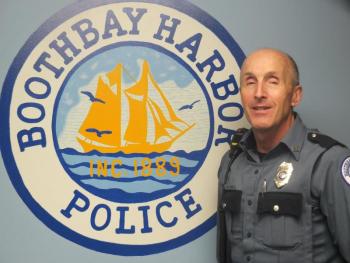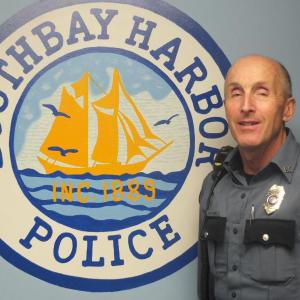Despite job’s increasing dangers, longtime policeman not thinking retirement
2018 was an especially dangerous year for law enforcement officers. One hundred forty-four policemen died in the line of duty. The data compiled by the National Law Enforcement Memorial Fund showed a 12 percent increase in the number of deaths. The data also showed 52 of the 144 deaths resulted from firearms which is a 13 percent increase. But the grim statistics don’t seem to phase Boothbay Harbor Police Officer Larry Brown.
Despite his over 31 years between Lewiston and Boothbay Harbor as a cop, the increasingly dangerous nature of his chosen profession isn’t persuading him to retire or seek a safer line of work. So why isn’t Brown more concerned about his job’s hazards?
“Well, I did retire once before after 22 years in the Lewiston police department,” Brown said. “After moving to Boothbay, I had several conversations over the years with Chief (Bob) Hasch and he convinced me to put the badge back on. And I’m glad he did.”
As a veteran police officer, Brown knows the risks. For two decades, he patrolled one of the hardest beats in Maine: the city of Lewiston. During Brown's Lewiston tenure, fellow police officer David Payne was shot and killed in the line of duty, as was Maine State Trooper Gil Landry.
So Brown is well aware of the potential hazards of being a cop. And those dangers hit close to home, once again, last April when a police shooting occurred in Norridgewock. Somerset County Sheriff’s Department Cpl. Eugene Cole was shot and killed trying to capture a fugitive.
“When something like that happens, I think, by the grace of God, go,” Brown said. “You think about it and realize it could happen to me. But I also remember my father who was a farmer. He almost died when a tire blew off a truck. He was standing atop a hay wagon, and it went down and drove his head into his chest. You can be hurt at anything.”
These tragedies make cops like Brown more aware about support they receive from fellow officers and a need to stay vigilant about potential life-threatening situations. He also acknowledges today’s law enforcement officers receive a great deal of safety training. So when a dangerous situations occurs, Brown is confident his life is in good hands due to support either from his fellow Boothbay Harbor officers or a county deputy sheriff.
But retirement and thoughts of a new career have crossed his mind. Brown arrived in Lewiston in the mid-1970s from his native Rhode Island. He worked 22 years for the Lewiston department starting as a patrol officer before moving to school resource officer, and finally finishing as a front watch sergeant.
But at age 44, Brown retired and along with wife Marti moved to Boothbay to run an East Boothbay bed and breakfast. The couple operated their business for several years until a persistent community voice talked him back into law enforcement.
In 2009, Brown returned to law enforcement as a part-time Boothbay Harbor patrolman. Hasch met Brown 20 years ago, and slowly worked on convincing the veteran cop to work for him. Hasch saw Brown’s commitment to community events and believed his experience and dedication to the public would make a great addition to his force.
Hasch described Brown as a genuine, kind and positive person with a knack for finding a good solution to problems. “Larry has had an extremely positive impact here,” Hasch said. “It’s desirable to ensure we fix a situation before someone gets in trouble. He counsels people in an attempt to fix a problem before it’s too late.”
Eventually, Brown’s job went from part- to full-time, and he became the department’s school resource officer. Brown revived an old program he used as Lewiston’s resource officer: Cop on the Spot. Brown meets with students in a classroom and talks about law enforcement. He breaks the ice by discussing his gun belt, handcuffs or another piece of police equipment before beginning a dialogue with students.
School shootings are a persistent topic during his classroom visits. In these sessions, Brown prefers hearing what’s on the students' minds to better understand their concerns. “We need to listen to see how this impacts students,” he said. “I tell them ‘Yes, this is terrible,' but remind them this is a safe community. I looked at this as a counseling or therapy session so I can work them through their concerns.”
Brown’s presence in the school system and community “cannot go understated,” according to Hasch. ”Every day, he keeps track of people in the community whether they have health problems or another issue he can assist with. It’s not uncommon for him to visit someone in the hospital on his days off. In my humble opinion, this is how police work should be done,” he said.
Working in a small community is also a factor in keeping Brown on the local police beat. Unlike in Lewiston, Brown knows nearly every student in the elementary and high schools. His reach also extends beyond current students. He stays in contact with graduates to see how the real world is treating them.
“College isn’t for everyone. For those who may have left school, I talk to them about their futures, and help them find something that better fits their skills. I’d like to see more kids get involved with the trades,” he said.
Brown turned 65 last year, but another retirement is still not on his mind. “If you could pick any job and do it forever, why would you stop? You wouldn’t. And that’s how I feel about this job," he said.
Brown enjoys the unpredictability of police work and interacting with people. But best of all, he loves this community which is the main reason Brown has no intention to stop protecting and serving his new hometown.
This story has been updated from its original posting.
Event Date
Address
United States























